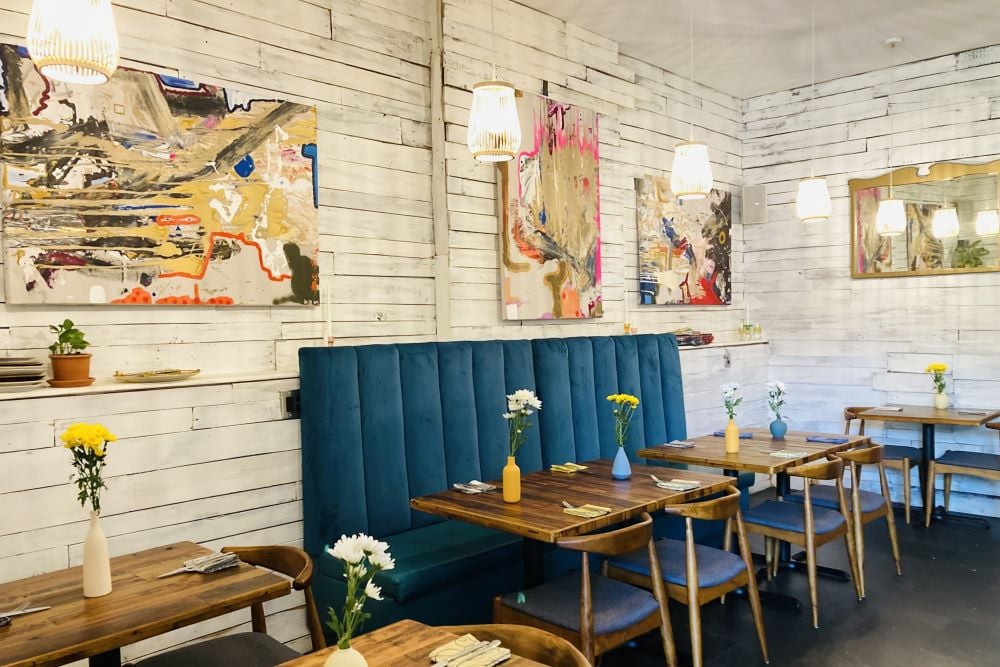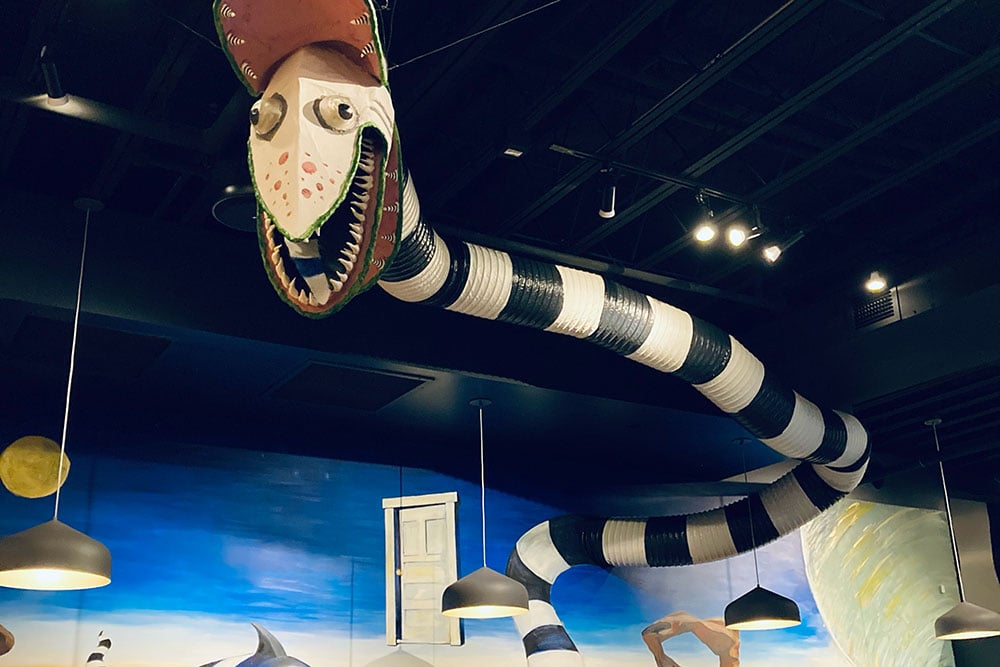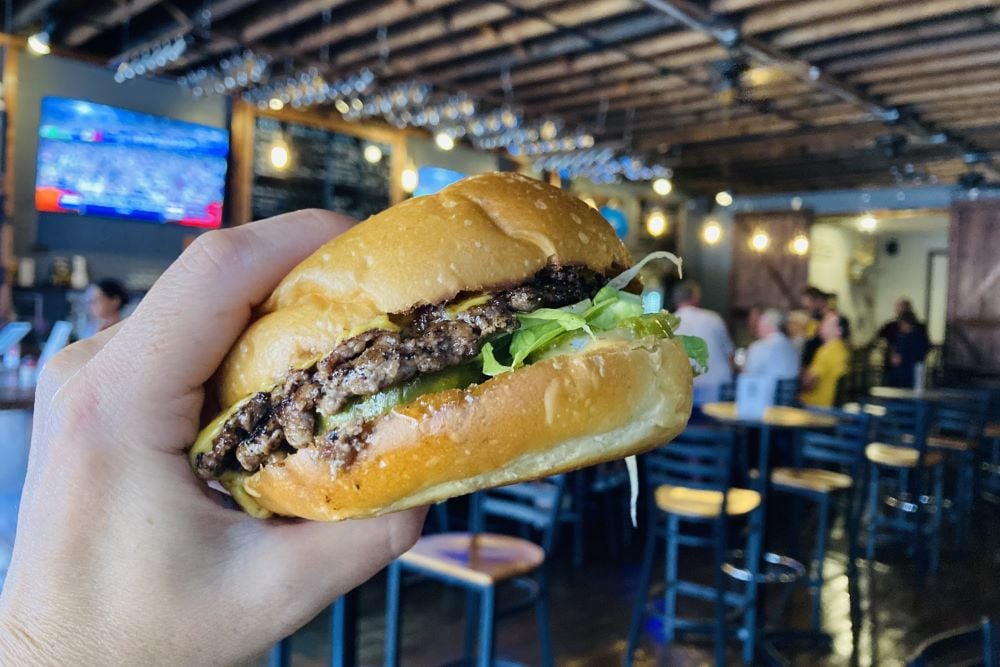Why Are Successful Vegan Eateries Closing in Pittsburgh While Others Thrive?
Our food editor talks with plant-based business owners about the state of the local scene.
Onion Maiden, a punk and heavy metal-centric vegan restaurant, is one of the hottest spots in Pittsburgh. And its owners are burnt out.
Co-owners Chef Diana “Dingo” Ngo and Brooks Criswell need some peace after operating the eatery — first as a food cart, then as an Allentown destination — for nearly a decade. The last day of service is Friday, March 31.
Fear not, herbivores! The space at 639 E. Warrington Ave. — which opened in 2018 — will host the company’s popular Chick Habit pop-up April 1-2, featuring a smaller, plant-based menu of chicken-ish sandwiches and other fast food-style vegan grub. Fans of Ngo’s faux poultry can look for it at the Bloomfield Saturday Market, too.
She’s not sure what the future holds for the Onion Maiden brand, but she knows that pressing pause on her passion is necessary for their mental and physical health.
“When we first opened we weren’t scared only because it was new and we were too busy,” says Ngo, who often works 14-hour days. “We didn’t have a moment to think ‘This is too much work’ or ‘This is not sustainable.’ We’ve been saying, ‘Let’s just get through the day’ since 2015.’”
Onion Maiden started as a form of activism to educate people about living a healthy, plant-based and eco-friendly existence. In addition to providing nutritious eats with punny names such as Aqua Poutine Hunger Force and Kale ‘Em All, Onion Maiden is a no-waste kitchen that uses all compostable and biodegradable materials.
“Onion Maiden is closing, not failing,” says Leila Sleiman, who, together with Natalie Fristick, founded Pittsburgh VegFest in 2015. “They’re not not doing well; it’s just incredibly hard to run a small business. It takes a whole city to support small businesses and family-run restaurants.”
Even with the success of VegFest, one of the country’s largest vegan festivals that annually attracts more than 8,000 people, Pittsburgh has lost a number of vegan restaurants over the last year, including Lawrenceville’s Reed & Co. and B52 cafe and Viridis in the South Side. Bellevue’s Valkyrie Doughnuts shut down indefinitely last month for restructuring.
On the flip side, ShadoBeni, a North Side spot for Trinidadian vegan cuisine, was named one of Pittsburgh Magazine’s Best New Restaurants of 2022. In Bloomfield, Apteka’s Kate Lasky and Tomasz Skowronski were nominated as semifinalists for the 2023 James Beard Award Best Chef in the Mid-Atlantic Region and was on Pittsburgh Magazine’s Best Restaurant list in 2022.
Jamie Parker’s all-vegan dessert business, Sweet Alchemy Bake Shop, has grown so much she’s moving to a bigger storefront with seating in New Kensington. It’ll reopen in mid-March at 945 Fifth Ave.
While working in the mental health field, she would come home at night and bake to relieve job-related stress. The hobby was also born out of necessity, as the longtime vegan found it hard to find treats she could eat and enjoy. She began operating as a Department of Agriculture-licensed, home-based bakery in 2016, before moving to a brick-and-mortar site in 2020.
Online sales helped Sweet Alchemy survive the pandemic. People wanted to shelter in place with Parker’s brand of donuts, lady locks, cookie sandwiches and pop-tarts. About 40% of her clientele aren’t vegans.
She expects the new space to be more of a neighborhood hub offering a quarterly vegan market, cooking and baking classes and culinary therapy. The large patio will feature seating and a community garden, where volunteers will grow veggies and herbs to donate.
Parker is saddened by the hard times faced by her vegan colleagues but isn’t surprised with high supply, rent and utility costs and low profit margins.
“There seems to be some glamorization of the food industry and I am not sure where this comes from, but this work is hard,” she says. “We are on our feet all day, working over hot ovens, fryers and stovetops. And since many of us are small businesses, we are doing a lot of things ourselves, from emails to menus to social media to production. Since I worked for over 20 years in a high burnout field, and now am in another field with high stress and burnout, I really believe in taking care of myself, establishing boundaries and saying no.”
Sugar Spell Scoops in Sharpsburg, Pennsylvania’s first all-vegan ice cream parlor, is only open on Sundays from 1 to 6 p.m., but owner Amanda Burke is always working.
“It takes all week to do the shopping, hunt down ingredients, make the ice cream, post on social media,” says Burke, who, in addition to making custom cakes and pies, packs about 600 pints of the cashew-based ice cream a week. “It’s just myself and my fiance. Even one Instagram post can take an hour.”
Pint preorders open on Fridays at 7 p.m. And customers can stop in on Sundays to pick up their stuff and perhaps stay for a float, sundae or scoop. Walk-ins are also welcome during business hours. Burke hopes to add at least one Saturday a month to the schedule to keep up with demand.
Despite brain freezes, Burke’s icy treats sell out fast.
Sugar Spell Scoops partnered with local band Limousine Beach for a combination pint/song release. The first in a series of sweet music collaborations drops Sunday, March 12.
Customers can hear the single “Liquid Teeth” on a flexi disc that includes a pint of Liquid Teeth, ruby chocolate ice cream with mixed berry bleeding gums sauce, white chocolate teeth and vanilla glaze.
Another local vegan business that continues to take a big bite out of the no-meat market share is Beechview-based Chip and Kale. Owners Zita Edsall and John Lopez opened the zero-waste, ghost kitchen a decade ago to deliver vegan-friendly frozen meal kits across Pittsburgh.
When the pandemic hit, the couple didn’t have to pivot; their business was already set up for online ordering and contactless delivery. They now ship their food, including soups, curries, pastries and Buffalo mac and cheese, to even more homes in the region, as well as Ohio, New York and Maryland.
“Even though the meals are vegan, you can customize them the way you want,” Edsall says. “A lot of our clients aren’t vegan, they just love how convenient meal kits are. And they’re so flavorful as is, most people don’t bother to add meat.”
Lopez, a carnivore who has cut back on his red meat intake, says affordability also helps the company maintain an 84% customer retention rate. After watching his wife’s cooking skills over the years, he decided to branch out on his own culinary adventure; a Neopolitian-style pizza pop-up that will have vegan options.
The as-yet-unnamed side hustle attracted a loyal following at last summer’s Mt. Lebanon Lion’s Club Farmers’ Market and will be regularly stationed at Back Alley Brewing Company, which opens in Dormont on March 16.
As she prepares for a future minus Onion Maiden, Ngo has advice for budding restaurateurs, whether their menu is plant-based or not.
“I would advise people to work in a restaurant,” she says. “I’ve worked in restaurants most of my life, in almost every position, and I became very nosy. I think a lot of people start off not realizing what goes into owning and running a restaurant. There’s backend stuff, paperwork, emails. There’s so much more than what you see on the surface.”
Ngo plans to take a well-deserved cross-country road trip during her time away from the kitchen, but you can bet she’ll be stopping at a bunch of vegan spots along the way.


















